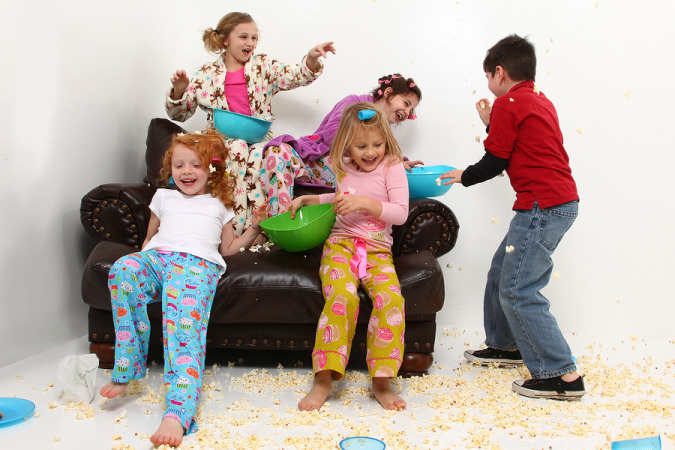So what is a sleepover? Well, according to Wikipedia:
‘A sleepover, also known as a pajama party, is a party most commonly held by children or teenagers, where a guest or guests are invited to stay overnight at the home of a friend. Typical participant activities include staying up late, talking, eating and playing until falling asleep, which sometimes never happens for a few high energy guests. Sleepovers are usually held at one participant’s house, with other guests sometimes bringing their bedtime things, such as pillows or sleeping bags.’
Sleepovers are practiced by both boys and girls although they do seem to be more common with girls.
There is no one definite age or stage to start having them as there are a number of factors that are important.
Are they ready?
• Have they stayed over at grandparents or cousins before?
• Are they adaptable and able to separate easily?
• Do they still need a certain routine to get to sleep (light on in room or landing for example)
• Are they going because they really want to or feel they will be ‘left out’ if they do not go?
• Are they comfortable with the other children who are going to be there?
Are you ready?
• If you are being asked to host a sleepover, are you doing it willingly or under pressure?
• If you ‘give in’ and are not happy, it will probably come across in all your interaction with the girls or boys. This may mean the experience is stressful for all involved and defeats the purpose in having it in the first place.
• If you say yes, be prepared to be flexible and know that you choose to facilitate it happening.
• Something is stressful to the degree that we feel have a choice or control. Having chosen to agree to it, then look at having some structure around the evening itself.
In General
• Choose a day when they are not going to be exhausted going into it and when there is no school or commitments (for you or them) the next day
• If they are older children, have guidelines around what you feel is going to be important. For example, noise levels, lights out time, DVDs if applicable (ensuring age appropriate for all in group). When they are younger you are often more directly involved so this may not be as necessary.
• If it is possible for them to bring their own duvet or pillows etc this can reduce stress for you and means they have some familiar items with them which may help if they find it harder to settle. This is something that generally changes as they get older and they seem to be able to sleep on anything at the drop of a hat!!
• Make sure they all know where the bathroom (and if you are lucky to have more than one, the nearest bathroom) is.
• Leave out any snacks that might be required. That ensures you have some control over what they are having (less E numbers and no raiding presses during night) and have some bottled water on hand for each child (important they have a drink but avoids knocking over of glasses etc).
• Give them space but keep an open ear and eye on them to ensure all going smoothly.
Sleeping over – over there
If your child has been asked to go to a sleepover
• Talk to the parent hosting the sleepover to check in re times for drop off and collect.
• Clarify anything which is important. For example, if they are 12 or 13 specifying that they are not allowed watch 15 rated films might be important. This may sound obvious but different families have different ways of doing things and values.
• Let your child know that it is ok to call if they change their mind.
• Chat to them before and afterwards to help them process the experience.
Benefits?
• Sleepovers can be, in a way, a rite of passage for your child. It is a stretching of their wings within a controlled environment (once you know and are happy with the parents hosting it) and gives them a sense of freedom and independence.
• It can give them the message that you trust them
• It is a situation where rules can be stretched (late night/early morning) in a way that is acceptable to you.
• It can strenghten the bond between friends and enhance their social skills.
Possible downside?
• Different parents and different families have different ways of doing things. This can be a benefit (for them to see that) but can also mean they are exposed to something you may not want them to be. Know the parents hosting the sleepover and communicate with them.
• If there are dynamics which they feel they cannot handle (depending on the group) it is more difficult for them as they cannot physically get away. That is why it is so important to let them know they can call at any time and that they are comfortable with the group.
‘If your children spend most of their time in other people’s houses, you’re lucky; if they all congregate at your house, you’re blessed’. Mignon McLaughlin, The Second Neurotic’s Notebook, 1966
I would love to hear from you. If you have any thoughts, stories feedback or ideas you would like to share, please forward them to me at marian@theparentcoach.ie

